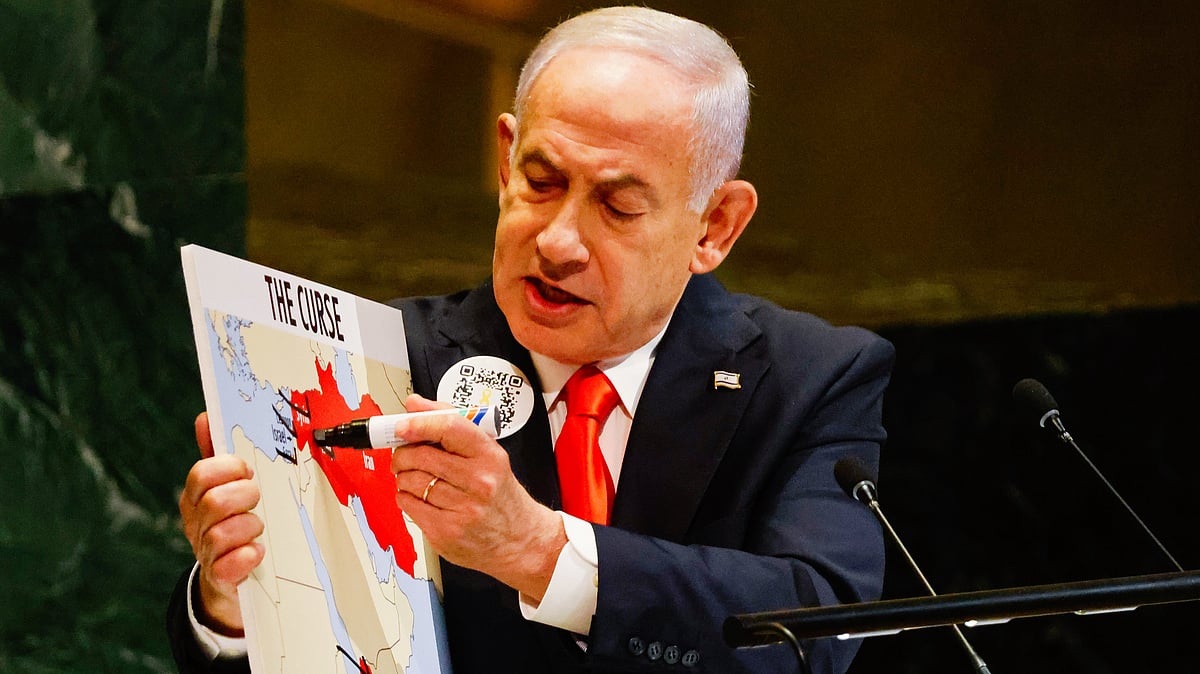World
At UN, Netanyahu vows to ‘finish the job’ in Gaza as global isolation deepens
Israeli PM left speaking to half-empty auditorium as delegates walk out

Israeli Prime Minister Benjamin Netanyahu delivered a defiant address at the United Nations General Assembly on Friday, vowing that Israel “must finish the job” against Hamas in Gaza even as his government faces mounting pressure, walkouts by diplomats, and widening international isolation over the war.
“Western leaders may have buckled under the pressure," he declared. “And I guarantee you one thing: Israel won't.”
The speech underscored the widening gulf between Netanyahu’s determination to press ahead and the growing chorus of global opposition. Delegates from multiple countries staged a mass walkout as he began speaking, while shouts echoed across the chamber.
Pockets of applause came from others, but the hall was notably thin of top-level representation and once the walkouts were done, Netanyahu was left speaking to a virtually empty hall. The United States and United Kingdom — Israel’s closest allies — sent only junior diplomats, not senior officials or their UN ambassadors.
Responding to recent decisions by several countries to recognise Palestinian statehood, Netanyahu accused them of emboldening extremists. “Your disgraceful decision will encourage terrorism against Jews and against innocent people everywhere,” he said.
Throughout the address, Netanyahu sought to project resolve. “Anti-semitism dies hard. In fact, it doesn't die at all,” he remarked, reiterating a charge he often levels at critics.
But outside the podium, Israel faces mounting legal, diplomatic and political challenges. The International Criminal Court has issued an arrest warrant against Netanyahu, accusing him of crimes against humanity, which he denies. The International Court of Justice is also weighing South Africa’s claim that Israel has committed genocide in Gaza — an allegation Israel vehemently rejects.
Published: undefined
The stakes were evident in the extraordinary steps Israel’s government took to amplify his remarks. Loudspeakers were set up on the Israel-Gaza border to broadcast his words into the territory, and Netanyahu’s office claimed the army would even commandeer Gaza residents’ mobile phones to push the speech live — though it remained unclear whether that was actually carried out.
As in past UN appearances, Netanyahu used props — holding up a map titled 'THE CURSE' and marking it with a thick pen — and symbolic gestures, including a hostages pin bearing a QR code linked to a website about the Hamas-led 7 October 2023 attacks. Members of his delegation wore matching pins.
Still, the timing of the speech highlighted the shift in Israel’s global standing. In recent weeks, Australia, Canada, France, the United Kingdom and others have recognised a Palestinian state. The EU is weighing sanctions. Earlier this month, the General Assembly passed a nonbinding resolution urging Israel to commit to a two-state solution — a proposal Netanyahu has repeatedly dismissed.
“I will tell our truth,” Netanyahu said before departing for New York. “I will condemn those leaders who, instead of condemning the murderers, rapists and burners of children, want to give them a state in the heart of Israel.”
Published: undefined
At a special General Assembly session earlier in the week, leaders from nation after nation condemned Hamas’s 2023 assault — in which about 1,200 people were killed in Israel and 251 hostages taken — but many also called for an immediate ceasefire in Gaza and urgent humanitarian relief.
Israel’s military response has killed more than 65,000 Palestinians, according to Gaza health authorities, displaced 90 percent of the territory’s population, and left growing numbers facing starvation.
While over 150 countries now recognise a Palestinian state, Washington has not, continuing to give Israel political cover. Yet even there, limits are surfacing: former US President Donald Trump said on Thursday he would not allow Israel to annex the West Bank, a move some in Netanyahu’s government openly advocate.
Netanyahu’s speech followed a video address by Palestinian Authority President Mahmoud Abbas, who was denied a US visa. Abbas welcomed the new recognitions of Palestine but urged stronger action, saying: “The time has come for the international community to do right by the Palestinian people” and support “their legitimate rights to be rid of the occupation and to not remain a hostage to the temperament of Israeli politics.”
For Netanyahu, the UN stage has long been a platform for defiance and symbolism. This year, however, the optics were starker: a prime minister determined to press on with the Gaza war, even as more of the world turns its back.
With AP/PTI inputs
Published: undefined
Follow us on: Facebook, Twitter, Google News, Instagram
Join our official telegram channel (@nationalherald) and stay updated with the latest headlines
Published: undefined